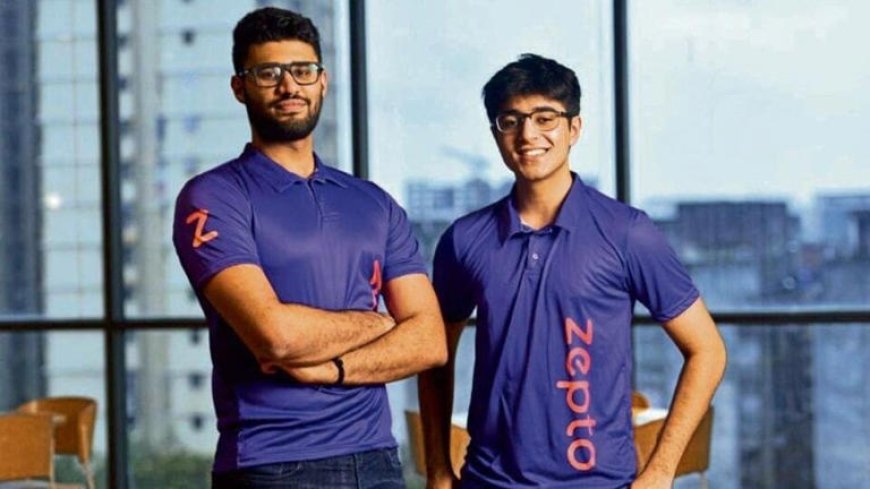Aadit Palicha Net Worth Rs 4300 crore Fortune as 2025, Know all about his Success Story
Aadit Palicha, the co-founder and CEO of Zepto, has emerged as one of India’s most promising young entrepreneurs.P alicha’s first attempt at entrepreneurship came at just 17 when he launched GoPool, a student carpooling app in Dubai.

Born in 2001, he was a computer science student at Stanford University but dropped out to tackle a real-world problem—fixing India’s grocery delivery system. In July 2021, along with his childhood friend Kaivalya Vohra, he launched Zepto with a bold vision: delivering groceries at lightning speed.
Aadit Palicha Early Life and Education

Born in Mumbai in 2001, Aadit was always drawn to technology and problem-solving. He completed his schooling at GEMS Modern Academy in Dubai, where he excelled academically and was even the school’s valedictorian. Alongside his studies, he developed a passion for public speaking and was a national-level debater.
His academic brilliance earned him a place at Stanford University, where he enrolled in a Computer Science program. However, something about sitting in classrooms while the world was rapidly evolving didn’t feel right to him.
He saw a bigger opportunity—one that didn’t require a degree but rather a bold vision and the courage to execute it.In a move that many would consider risky, he made the tough decision to drop out of Stanford to pursue entrepreneurship full-time. Looking back, it was a gamble that paid off spectacularly.
Aadit Palicha Net Worth
As of August 2025, Aadit Palicha's net worth is estimated at ₹4,300 crore. This significant wealth is attributed to the rapid growth and valuation of Zepto, the quick-commerce startup he co-founded.
| Name | Aadit Palicha |
|---|---|
| Net Worth | ₹4,300 crore |
| Ownership Stake in Zepto | 10% (approx.) |
| Zepto’s Valuation | $5 billion |
| Personal Assets | Not disclosed |
| Primary Source of Wealth | Zepto |
Aadit Palicha Zepto Shareholding
As the co-founder and CEO of Zepto, Aadit Palicha holds a significant portion of the company’s shares. While exact details about his personal shareholding aren't publicly disclosed, as the co-founder and driving force behind Zepto, it's expected that he holds a considerable stake, likely a major portion of the equity, along with Kaivalya Vohra, the other co-founder. His stake in the company has likely contributed to his estimated net worth of ₹4,300 crore as of 2024.
Zepto Investment History
| Funding Round | Amount Raised | Valuation | Date |
|---|---|---|---|
| Initial Seed Round | $1.2 million | Not disclosed | 2021 |
| Series A | $60 million | $225 million | 2021 |
| Series B | $100 million | $570 million | 2021 |
| Series C | $200 million | $900 million | May 2022 |
| Unicorn Status (Series D) | $200 million | $1.4 billion | August 2023 |
| Subsequent Fundings | $665 million | $3.6 billion | June 2024 |
| Additional Funding | $340 million | $5 billion | August 2024 |
Business Ventures and Entrepreneurship Journey
Aadit Palicha's journey to success wasn't without its obstacles. Leaving Stanford University was a bold decision, and it came with its fair share of challenges. Many doubted his choice, but Palicha firmly believed that real-world experience would teach him more than anything he could learn in a classroom. His decision wasn't just about taking a risk—it was about pursuing a vision he was passionate about.

While the idea was promising, it didn’t take off as expected. Instead of being discouraged, he took it as a learning experience.Later, he and his childhood friend, Kaivalya Vohra, launched KiranaKart, a hyperlocal grocery delivery service.
The startup operated for about ten months, but they struggled to achieve the right product-market fit. Instead of forcing something that wasn’t working, they decided to shut it down.
Most people would have given up at this stage, but for Palicha and Vohra, these failures were stepping stones. They had learned what not to do, which set the foundation for their next big move—Zepto.
Zepto Founding
The idea for Zepto was born during the COVID-19 pandemic, when online grocery deliveries often took days to arrive. Palicha saw an opportunity—what if essential groceries could be delivered in just 10 minutes?
This was an ambitious goal, but he was determined to make it work. In July 2021, he and Vohra launched Zepto, a startup that promised ultra-fast deliveries using a network of micro-warehouses strategically placed across cities.
Initially, people were skeptical. How could a company sustain such quick deliveries while remaining profitable? But within a year, Zepto proved everyone wrong. The startup scaled aggressively, expanded to multiple cities, and attracted millions of customers who loved the convenience.
As Zepto grew, skepticism followed. Critics questioned whether such rapid expansion and ambitious targets could be sustained. But Palicha's ability to think strategically, alongside a strong team and solid investor support, allowed Zepto to not only meet but exceed expectations. This resilience in the face of doubt speaks to his determination and entrepreneurial spirit.
Palicha has often spoken about the importance of adaptability for young entrepreneurs. In the ever-evolving world of startups, he emphasizes the need to quickly iterate, pivot, and keep pushing forward. His journey proves that the road to success is rarely straight, but with the right mindset, you can navigate through the challenges and come out stronger.
Zepto’s Rise and Valuation
What set Zepto apart was its promise of delivering groceries in minutes, a model that quickly captured consumer interest. The startup grew rapidly, and by August 2024, it secured a $340 million funding round led by General Catalyst, pushing its valuation to a staggering $5 billion. This milestone cemented Zepto’s position as a leader in India’s quick-commerce revolution.
While Zepto’s growth has been impressive, it hasn’t been without challenges.Skepticism from investors and industry veterans – Many believed the 10-minute delivery model was unsustainable.
Operational efficiency – Maintaining speed without sacrificing profitability required cutting-edge logistics and AI-driven supply chain management.Scaling at breakneck speed – Expanding to multiple cities while keeping operations smooth was no easy feat.

